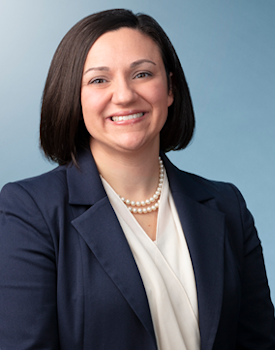
Lauren Barron is an attorney in the Private Client Group of the law firm Faegre Drinker Biddle & Reath LLP, where she advises on trusts, estates, and tax matters. Lauren attends Saint Anne’s parish in Hamel, MN, and her children attend Providence Academy in Plymouth, MN. Below, she highlights key changes to inherited IRAs to keep in mind when estate planning.
Last year, Congress passed the Setting Every Community Up for Retirement Enhancement Act — better known as the SECURE Act. The legislation changed a variety of rules related to retirement accounts, including the payout rules for inherited IRAs. In light of these new laws, it’s important to review your beneficiary designations and consider whether the SECURE Act has affected your plan.
10-Year Rule Replaces the “Stretch” Payout
Required minimum distributions (RMDs) can no longer be paid out over the beneficiary’s life expectancy—or “stretched”—to defer income tax. Individual beneficiaries, such as a child or a grandchild, must now withdraw the entire balance of an inherited retirement account within 10 years of the participant’s death. If you’re concerned that your retirement plans will be fully paid out to your beneficiaries within 10 years of your death—especially for reasons other than taxes, such preserving assets for the next generation or protecting against creditor situations such as a divorce or accident liability—you might consider restructuring your plan.
There are a few exceptions to this new rule. The RMD life-expectancy payout rules still apply to a spousal roll over, and there are new carve outs for minor children, disabled or chronically ill persons, and individuals not more than 10 years younger than the participant.
Planning Opportunities
01 Charitable beneficiaries. Designating one or more charities as a primary beneficiary of your retirement plan is still sound tax planning. The charity will not pay the built-in income tax liability on the assets, and the gift reduces any taxable estate at your death. And, designating any charity as the contingent beneficiary gives an individual primary beneficiary the opportunity to decline the inheritance and instead pass it on to the charity to achieve the same tax benefits.
02 Charitable Remainder Trust (CRT). Naming a CRT as beneficiary may mimic the stretch payout. CRTs receive retirement assets in a lump sum without paying income tax. During the term of a CRT, the trust makes annual payments to individual beneficiaries who pay income taxes on the distributions. This effectively stretches income tax deferral over the trust term. The trust term typically runs for an individual’s lifetime or a fixed period up to 20 years. At the end of the term, the trust pays its remaining assets to designated charitable organizations. The remaining amount passing to charity must be at least 10 percent of the initial trust value.
03 Trust for descendants. If your beneficiary is a trust for descendants (created either by your will, revocable trust, or stand-alone trust agreement), you may need to review the trust terms. Because many trusts require outright distribution of retirement plan assets, the SECURE Act will cause the assets to be fully paid out of the trust to the individual beneficiaries within 10 years (or five, in some cases). If you planned on leaving retirement assets in trust to be distributed in smaller amounts over a longer period, you may need to change the trust terms. A trusteed IRA may also be a simplified solution.
Ready to Plan?
The SECURE Act is a major shift in estate planning with retirement accounts. It’s best to consult with your attorney, accountant or other professional advisor to ensure that your current plan is still consistent with your financial and estate planning goals. When you’re ready to learn how CCF can partner with you on a CRT, call us at 651.389.0300.
We advise you to seek your own legal, tax, and financial advice in connection with gift and planning matters. The Catholic Community Foundation of Minnesota and its staff do not provide legal, tax, or financial advice.

